Canada Sanctions More Iran-Based Individuals And Entities
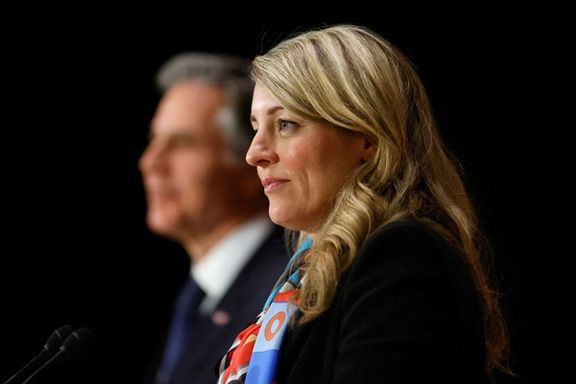
Canada has extended its list of sanctions on the Islamic Republic’s officials over the regime’s human rights violations such as denial of women’s rights and crackdown on protests.

Canada has extended its list of sanctions on the Islamic Republic’s officials over the regime’s human rights violations such as denial of women’s rights and crackdown on protests.
In a statement issued on Friday, Foreign Minister Mélanie Joly announced that Canada is imposing additional sanctions under the Special Economic Measures (Iran) Regulations.
The additional sanctions target four individuals and five entities that Ottawa said were tied to Tehran's "systematic human rights violations" and actions that "threaten international peace and security."
“Despite the Iranian regime intensifying efforts to brutally repress demonstrations across the country, the people of Iran continue to stand up for the rights of Iranian women and girls, and a better future for all Iranians,” read the statement, adding that "Canada will not stand idly by while the regime’s human rights violations increase in scope and intensity against the Iranian people."
The new list included a Revolutionary Guard commander Morteza Talaei, who was also former Commander of Tehran’s police; Ali Ghanaatkar Mavardiani, a senior judge, prosecutor and interrogator of the regime who used to work in Evin Prison Court; and Hassan Karami, Commander of the Islamic Republic’s Law Enforcement Forces Special Units.
The new blacklisted entities include Safiran Airport Services, a cargo and commercial airline that has coordinated military flights between Iran and Russia, sending lethal Iranian-made Unmanned Aerial Vehicles (UAVs) to Russia. Another is Baharestan Kish Company, a subsidiary firm of the IRGC Cooperative Foundation that has entered into agreements with the Basij paramilitary forces to develop Shahed-series UAV components. Canada also sanctioned Javan News Agency, a media outlet under the Basij that disseminates anti-Semitic messaging and the Iranian regime’s propaganda.
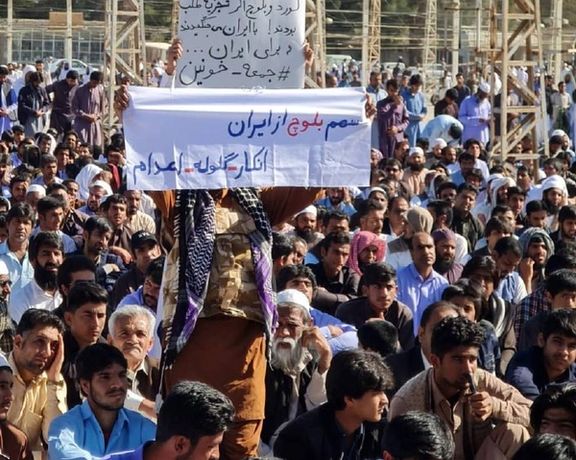
People turned out in large numbers in Iran’s Sunni city of Zahedan Friday to show support for their religious leader Mowlavi Abdolhamid who has been defying the regime.
Residents of several cities Sistan-Baluchistan Province, including its capital Zahedan, held demonstrations after Friday prayers as they have done since unrest began in mid-September in Iran. The protesters are especially enraged over a recently leaked document that revealed Supreme Leader Ali Khamenei has ordered his officials to defame Abdolhamid, the most prominent religious leader of Iran's largely Sunni Baluch population living in the province.
Earlier this week the hacktivist group Black Reward breached the data servers of Fars news agency, affiliated with the Islamic Republic's Revolutionary Guard, and released several documents indicating that Khamenei is dismayed by Abdolhamid’s remarks, who has been critical of Iran’s autocrat for the indiscriminate crackdown on protests in the province and elsewhere.
Relations between Abdolhamid and the government became tense after security forces opened fire on demonstrators in Zahedan September 30, killing more than 80 people.
In addition to Zahedan on Friday, protesters in Chabahar, Khash, Iranshahr, and Zahak, chanted slogans such as "Sheikh-ul-Islam (Abdolahamid) is with God, Khamenei is disgraced,” “Salute to Mowlavi, Death to Khamenei,” and “With Hijab or without hijab, moving towards revolution.”
According to videos posted on social media, security forces clashed with protesters in Zahedan and used teargas to disperse the gathering.
During his Friday prayer sermon earlier in the day, Abdolhamid decried the torture of detained protesters and warned the Islamic Republic against issuing verdicts that call protesters mohareb (muharib), which means warrior in Arabic. In Iran’s Islamic law the term means ‘enemy of God’ which carries the death penalty.
"A prisoner is a captive. Beating, insulting, cursing and assaulting him is against the teachings of Imam Ali (the first Shiite imam), Ahl al-Bayt (the family of Islam’s Prophet Muhammad), Hazrat Rasool (Prophet Muhammad) and Islam. The dissidents and critics should be treated in an Islamic manner,” he emphasized.
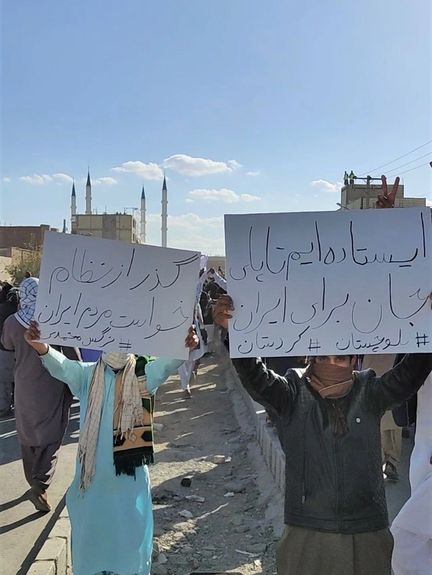
Abdolhamid went on to say that the nation has endured problems for 44 years, now they are protesting, insisting that their protests should not be a pretext to execute them. He said that their demands are legitimate, adding, "We want our country to be safe and united. We don't have Shiites, Sunnis or ethnic groups here. We are all Iranians. From Zoroastrians and Dervishes to Baha’is. They are also human and Iranian, and their rights should be respected…If an American or an Israeli speaks the truth, it is still the truth," he said.
Dervishes of the Gonabadi order are among religious groups seen as potential security threats in Iran, and are regularly persecuted by the regime. Baha'is, who number around 300,000 in Iran, also say their rights are systematically violated and they are often harassed, forced to leave their homes and businesses, and are deprived of government jobs and university education. Khamenei has on several occasions called the Baha'i faith a cult and in a religious fatwa in 2018 forbade contact, including business dealings, with followers of the faith.
Referring to the recent leak and the regime’s efforts to tarnish his image, Abdolhamid said "If the reign and power are in your hands, it was God's will. If we have respect and love of people, it is also a God's gift. What God gives, only He can take back. God gives honor and takes it away. No one else can take someone’s honor."
Abdolhamid's popularity is largely because of his willingness to challenge Khamenei’s absolute power. Earlier in November, the outspoken Sunni Imam said women, ethnic and religious groups have faced discrimination after the establishment of the Islamic Republic in 1979.
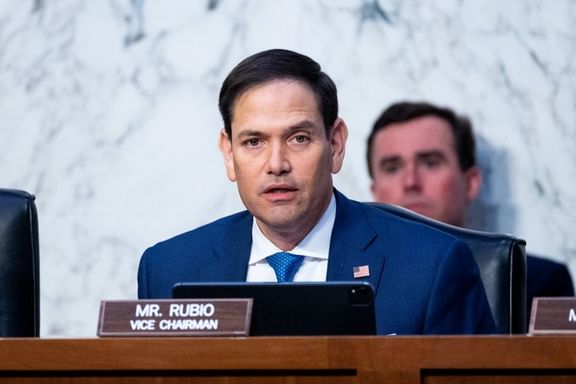
US Republican Senator Marco Rubio has asked the White House to look into reports that a Chinese firm is supplying Iran with technology that can be used against protesters.
NBC news has reported that Tiandy, which is providing facial recognition technology to the Chinese authorities is also equipping the Iranian government with surveillance technology.
Sen, Rubio sent a letter to the Biden administration November 30, obtained by NBC, that the company’s dealings with Iran “raise serious questions about whether Tiandy’s products are being used against peaceful Iranian protesters.”
Human rights organizations say that Iran has killed more than 450 protesters since mid-September and imprisoned thousands, sentencing more than a dozen to death.
The company’s website shows that it has sold equipment to Iran’s notorious Revolutionary Guard and other security agencies, while Intel Corp. lists Tiandy as a partner providing its processors for some of the Chinese firm’s video recording equipment.
Sen. Rubio has asked the State, Treasury and Commerce departments to see if Tiandy has violated US laws against assisting organizations violating human rights.
“I request that you determine and report to the Congress whether Tiandy has engaged in conduct that may meet the criteria for designation pursuant to the authorities provided by Congress,” Rubio wrote.
While several Chinese surveillance firms are under US sanctions, Tiandy is not one of them. Experts say the company is one of the most dangerous among similar Chinese firms.
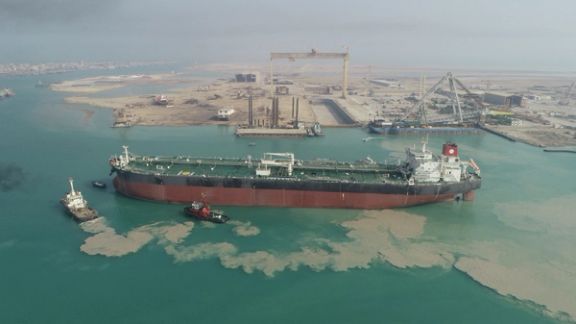
Is a United States decision to ease oil sanctions on Venezuela a precedent for dealing with Iran? Or does it reduce pressure to get more Iranian oil to market?
A move by administration of President Joe Biden to allow Chevron, the second biggest US oil company, to export Venezuelan oil followed talks beginning Saturday in Mexico between the government of President Nicolas Maduro and the opposition. Revenues currently frozen abroad will be ringfenced by the United Nations into ‘humanitarian spending.’
Battling high inflation, alongside food and medicine shortages, the Venezuelan government has said the “kidnapped” fund would go into helping stabilize the electric grid, improve education infrastructure, and improve the response to this year’s flooding. The UN will manage a fund for over $3 billion currently held by US and European banks fearful of punitive US measures.
But the decision has been criticized on several grounds. The Boston Herald in an editorial November 28 mocked Biden’s interest in “climate-destroying fossil fuels,” suggesting he was offering the Venezuelan government “a political reward” while appeasing US “eco-progressives” over US shale production, slowing as the release of US emergency reserves eases, while the December 5 deadline for tighter Russia sanctions looms.
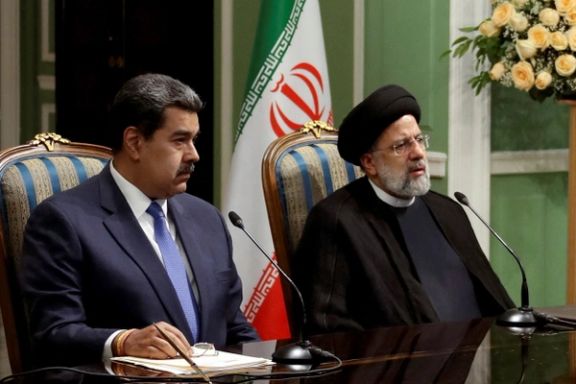
An investigation by the Reuters news agency, in a feature published Wednesday, highlighted close links between Venezuela and Iran in cooperating to evade Washington’s eagle eye on oil transports. Reuters reported super-tanker Young Yong disguising Venezuelan oil as Malaysian oil. The vessel belongs to a company owned by a Ukrainian national also sanctioned, and is one of three tankers designated November 3 by the US for forging documents to ship Tehran’s oil and so evade US sanctions on Iran.
Gaining an economic windfall
Links between Caracas and Tehran partly explain those arguing against relaxing US pressure on Maduro government and that a double standard is at play. Eddy Acevedo, an advisor at the Wilson Centre, has argued that “both rogue regimes are looking to extract concessions in hopes of gaining an economic windfall.”
Iran and Venezuela in June signed a 20-year cooperation agreement, three years after President Donald Trump in 2019 ramped up sanctions against Venezuela after Maduro won the disputed 2018 election and four years after Trump launched ‘maximum pressure’ against Iran as he withdrew the US from the 2015 Iran nuclear agreement.
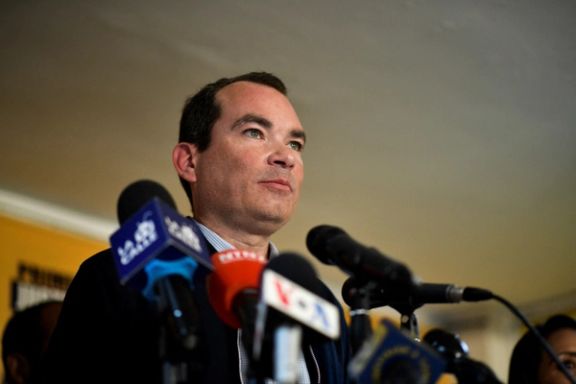
The Reuters report suggested Iran had “pioneered” the use of false documents to conceal the origins of cargoes. According to the news agency, around 200 tankers, including 82 super-tankers able to carry up to 2 million barrels, have been involved in servicing both Venezuela and Iran, with the south American country exporting over 360 million barrels in the face on US sanctions since 2019.
‘Smart’ sanctions?
Documentation in the Young Yong case were supplied to Reuters by advocacy group United Against Nuclear Iran, which has since 2013 tracked Iran’s oil traffic to “disrupt…[its] attempts to generate profits from oil sales and further isolate the regime economically.”
So, what are the implications of the Venezuela decision for US Iran policy, when Biden still aims to reach diplomatic agreement to revive the 2015 nuclear agreement? Some analysts in Tehran have argued that Europe’s need for energy in the wake of sanctions against Russia, coupled with upward pressure on US gasoline prices, increased the likelihood of Washington meeting the Iranian demands of ‘guarantees’ that have reportedly stymied talks to revive the 2015 agreement, the JCPOA (Joint Comprehensive Plan of Action).
A decision to replace blanket sanctions on Venezuela with ‘smarter’ measures could create a precedent over Iran. As the Venezuela decision loomed earlier in the month, Reuters suggested the US was looking to replace hidden oil trade, a response to sanctions, with transparent transactions. But at the same time, Venezuela pumping more oil could reduce pressure on Biden to compromise with Iran.

The Islamic Republic has sentenced four people to death for what the judiciary calls “cooperating with the Israeli intelligence service and committing kidnappings.”
Iran’s Mizan News Agency, which is affiliated with the Judiciary, said Wednesday that the four, who had been arrested back in June, have been “destroying private and public property and obtaining fake confessions.”
The Islamic Republic has long accused arch-enemy Israel of carrying out covert operations on its soil. However, it has not provided evidence to prove its claims against those who received the death penalty. Iran’s judiciary never holds such trials transparently and it is not clear if such trials have indeed been held.
Throughout the years, due process has not been implemented during political and security trials while the Islamic Republic often accuses Israel and the West of having spies in the country.
This time the identities of the accused have been announced, alleging that “with guidance from the Israeli intelligence service, this network of thugs” were committing crimes.
Israeli is believed to have been behind assassinations and acts of sabotage against Iran’s nuclear facilities, but no one was ever put on trial for these incidents.
On Wednesday, three other people were handed prison sentences of between five and 10 years for alleged crimes such as acting against national security and possessing illegal weapons.
International community and human rights organizations have repeatedly expressed concerns about Islamic Republic’s detentions, sham trials, and the death sentence for people.
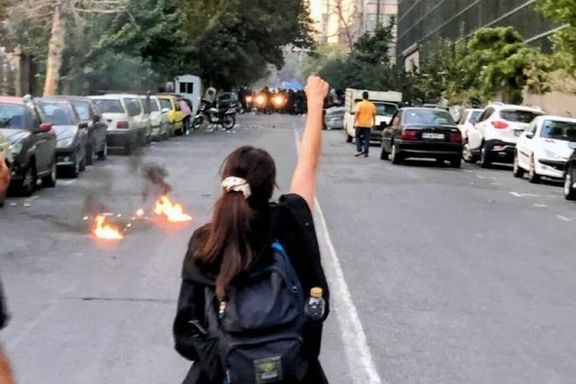
A Revolutionary Court of the Islamic Republic will try ten adolescent protesters Wednesday on charges of “war against God, corruption on earth and murder” that can carry the death sentence.
The move has led to widespread objections as several activists and organizations have expressed deep concern.
A committee monitoring the situation of recent protest detainees said, “these children are not having their own defense teams and lawyers appointed by the judiciary are supposed to represent them.”
A law in Iran forbids those charged with political crimes to hire their own lawyers.
They are charged in the death of a Basij militia member during protests on November 3 in Karaj west of Tehran.
Mohsen Borhani, a lawyer, and professor at Tehran University, had earlier warned about the trial of several detained minors in revolutionary courts.
During the popular uprising in Iran, over 18,000 citizens have been arrested and some of them were accused of “corruption on earth” and “war against God” which may carry the death penalty.
On Tuesday, Amnesty International called on governments with embassies in Iran to send observers to ongoing trials where protesters are at risk of being sentenced to death.
Amnesty said in a tweet this includes a group trial starting November 30 of 11 people, before Branch 1 of Revolutionary Court in Alborz.
“Amnesty is also extremely concerned at reports indicating children are among those at risk of being sentenced to death in mass trials in connection with protests, which would be a flagrant violation of international law,” it added in a statement.